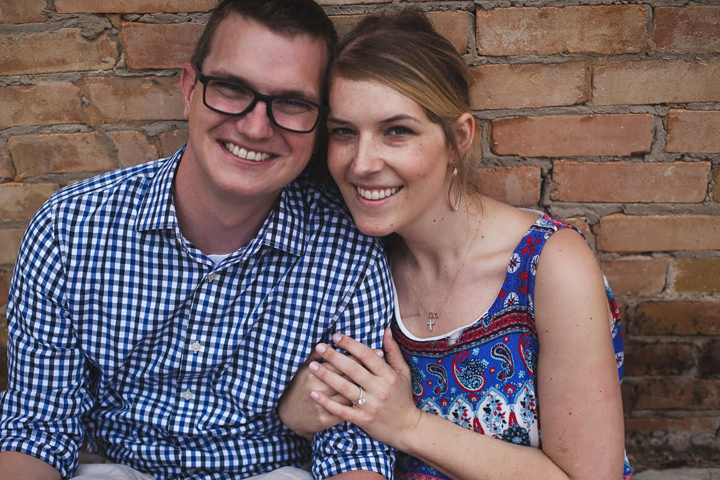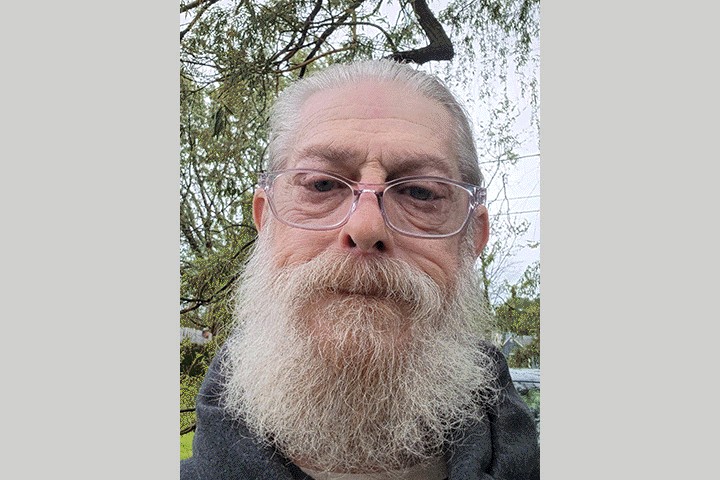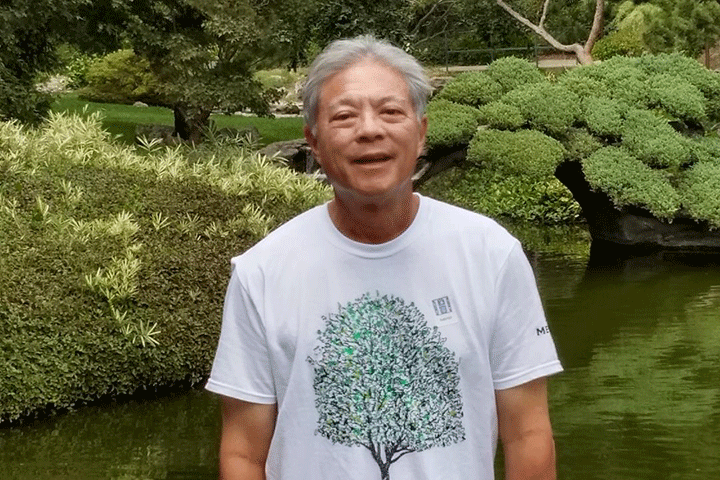A Clinical Trial for a Rare Pancreatic Cancer

- Pain leads to a shocking diagnosis
- Chemotherapy is a first step
- Genetic testing leads to a clinical trial
I was 31 years old, focused on my career in hotel management, had just been promoted to General Manager, and had been dating “the one” for almost a year.
The spring of 2017 was a busy time at work, and I was focusing on what I needed to do in order to be successful. When I developed a pain in my left side that did not go away, I figured it was just “stress” and I needed to drink more water, cut out gluten, dairy, meat, etc. I tried everything to determine what the problem was without taking time out of my schedule to go to the doctor. However, nothing helped the pain, which would come and go, so I decided to go to my doctor.
I wasn’t in much pain the day of my appointment, and I was irritated with myself for going. My doctor ordered a CT scan; when I went back the following week for the results, she told me that nothing was seen and suggested I take Prozac to help with anxiety and stress. I took the report, read over it, and saw the word “mass” in there but figured nothing was wrong because that was what the doctor said. But I did not take Prozac because I wasn’t anxious. Instead I went to see a GI doctor. I was in a lot of pain that day. The doctor scheduled a colonoscopy for the next week. I hated to wait but I trusted this doctor and knew he would find out what was wrong with me.
But the pain kept progressing. I would break out in a heavy sweat, I couldn’t eat, couldn’t sleep, and couldn’t wait for the colonoscopy. The Monday before the procedure was scheduled, I went into work early because I had a presentation to do that day, for my mid-year review. I was close to my supervisors, who were aware I was not feeling well—I had gone home early a few times because of the pain. When one of the supervisors saw that I was dripping in sweat, couldn’t focus, and was just crippled from the pain, she sent me home and told me to go to the ER if it got worse. I remember thinking that the pain will pass, I don‘t need to go to the ER, and that I worked for weeks on this presentation and just wanted to get it over with. But then I was thankful that she let me go home and lie down.
After I got home the pain increased to the point where I thought I was going to pass out in my bed. I called Eric (my then-boyfriend) and told him what had happened and that I might need to go to the ER. I also called my dad, who called Eric to tell him to take me in when he got home.
I wasn’t in pain when I got to the ER, where I had blood tests, an ultrasound, and answered questions about my health. My mom joined us at the hospital. When the ER doctor came in and said there were “lesions on my liver,” I saw her face drop but didn’t know what that meant. I had never heard the word “lesions” before. I was taken to a room and hooked up to an IV for pain medicine to help me sleep that night. Lesions? Admitted? I had no idea what was going on.
Finally, a Diagnosis
The next day, I had a biopsy. I knew things were serious because my dad joined me at the hospital. I started to feel a little better, walking the halls and eating a bit. My goal was to get home in time to celebrate my birthday. I didn’t realize I was on the oncology floor until I saw a text on my mom’s phone. My gut dropped. I had cancer? On Thursday the doctor told me I had neuroendocrine cancer and would need a shot once a month as treatment. I could handle that. I had so many questions, but he kept telling me “take one exit at a time.” That saying has stayed with us until this day—one exit at a time.
I finally went home and celebrated my birthday with my family, Eric, and his family. But I got a call from the oncologist—the other scans came back and he wanted to talk to me and my family. I told him it was my birthday but we would be there in the afternoon.
The mass on my pancreas was not neuroendocrine cancer, but instead was acinar cell carcinoma, another rare form of pancreatic cancer. All I heard was chemo, that my hair would fall out after the second treatment, and the rest was a blur. My parents kept telling me it would be okay and they were there for me.
A Second Opinion
Eric’s dad is a doctor, and through him I went to UT Southwestern (in Dallas, Texas) for a second opinion with Dr. Shaalan Beg, who was so patient, so kind, and so trustworthy. He explained the different stages of cancer and that I had stage IV, since it had metastasized to my liver and lymph nodes. A treatment plan of chemo every two weeks would begin after I had a port placed in my chest.
The appointment was a bit of a blur. I remember walking out and just collapsing in the hallway with my parents. I cried and they reminded me I was never alone. I wasn’t sad or mad I had cancer, but I felt like I had let my family and boyfriend down. They had to endure this hardship with me and I had no idea where this journey would take me.
Treatment and Genetic Testing
My chemo was with a combination of drugs including 5-FU, leucovorin, irinotecan, and oxaliplatin, along with several others. I had 14 rounds of chemo, although the oxaliplatin made me so sick that the doctor took me off it after 10 rounds. Every two weeks I went to the hospital and left with a pump that I wore for 48 hours. I had about 10 to 15 other medicines to help control the awful side effects. These included Neulasta injections, potassium, nausea patches, morphine, Compazine, Ativan, Phenergan, Zofran, Zoloft, Xanax, Miranol to help with my appetite, Celebrex, Restoril, as well as special mouthwashes and toothpaste because of the mouth sores I got from chemo. I used to have this little pill bag I took everywhere with me.
I was sick nine out of 10 days and was withering away. I lost my hair, lost the spark in my eye, and all my physical strength. I couldn’t even pick up my four-year-old nephew any longer, which completely broke my heart. He would ask me, “Do you feel better today, Auntie Alli?” All I wanted was to be able to pick him up, and say, “Yes, I feel better”. My boyfriend proposed to me after my fifth treatment. He believed in me so much and had so much hope, so I had to continue fighting. However, there was no quality in my life when I was so sick. I was desperate for a break, I even asked my mom, “How long can I live without chemo?”
At the start of treatment Dr. Beg had my biopsy sent for genetic testing. In a surprise to all of us, the testing center called him because they found a mutation called RET fusion. I remember Dr. Beg saying “they rarely call because they don’t always find something.” He also said that there are clinical trials for drugs that target specific mutated genes.
After we found out about the mutation, my mother called MD Anderson in Houston. I went there in January and met Dr. Vivek Subbiah, the most joyful doctor I have ever seen. He was confident that the trial medicine would work, my hair would grow back, I would get married, and the tumors would shrink. That was a lot to be confident in, but I saw the hope and sparkle in Eric’s and my parents’ eyes. I knew I had to try this and stop the chemo regimen.
Life with Hope on a Clinical Trial
I started the trial at MD Anderson in January 2018 and am still on it. The drug company pays for my travel, the medicines, and the costs that I incur as I travel to Houston for my appointments. My tumors have shrunk nearly 40 percent. I got married in April. And I can pick up my nephew.
I haven’t really had any physical side effects from the drugs. However, I have the emotional struggle. I was so checked out of everything last year, just trying to get through each chemo treatment. Now, everything is coming back and I am processing those emotions. Writing really helps and I hope to write a book.
My life has hope now, and I have gained strength by telling my story and hopefully giving hope to other people out there. You just have to take everything one exit at a time, like my doctor told me.






